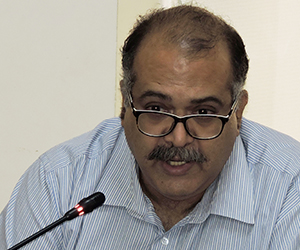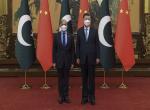With the exit from the government of the Maulana Fazlur Rehman led faction of the Jamiat Ulema Islam (JUIF), the perpetually buffeted – by an overbearing military, an hyper active and interventionist judiciary, a hostile media and fickle and demanding allies – PPP-led coalition government in Pakistan is facing yet another bout of instability. The wily Maulana has walked out of the coalition at a time when it was contending with multiple crises. Not surprisingly, questions have once again been raised questions over the survivability of the government, more so because another crucial coalition partner, MQM, is literally straining at the leash to break away from the coalition.
Adding to the troubles of the government is the coalescing of the opposition parties, and some members of the ruling coalition, against the Reformed General Sales Tax (RGST) bill that the government must get passed through parliament to get the next tranche of the Structural Adjustment loan from the IMF. The failure to impose the RGST could lead to a drying up of the aid tap. It is feared that the economic meltdown and hyper inflation that will result if aid flow stops might unleash large scale street disturbances and economic rioting that will almost certainly have an impact on the political system in the country.
At a time when Pakistan is staring down the edge of an abyss, it is saddled with a government that is perceived to be both horrendously corrupt and astoundingly incompetent, and therefore increasingly untenable. An impression that the current government’s days are numbered has been steadily gaining currency. Going by recent historical record, the life of an elected government is generally around three years, and if history is any guide to future then the PPP government has almost reached its sell-by date. But while all the signs on the ground and reports in the media would suggest that the government is on its way out, the problem is that despite predictions of mortality of the regime for nearly a year and a half now, the government has managed to survive. Therefore, as things stand, there is no simple answer to the question of whether the government will collapse or will survive for some more time, and perhaps even complete its full term in office. An educated guess of the future trajectory of Pakistani politics can be, however, made with the help of what can be called the game theory of Pakistani politics.
The political game in Pakistan has an iron law – actually a paradox – according to which the stronger a government, the more vulnerable it is and greater the chances of its ouster because of a crisis; conversely, a weak and tottering government is actually stronger, not so much in terms of its ability to govern or deliver but in terms of its chances of survival in office. ‘Strong’ civilian governments in Pakistan, which appear to have covered all their bases and tied up all the loose ends that could unravel their hold on power, invariably tend to overplay their hand. This invites a reaction from opponents who defend their interests by acting either alone or in concert with other affected players. Weak governments, on the other hand, are always compromising and giving in to pulls and pressures in order to survive. Plus, they are not considered a threat by the other players who want such governments to continue as long as they have not tied up other loose ends of their political game plan.
Of course, there are some complexities in this iron law which add to the difficulties in making the right call on the longevity of a government, especially a civilian government, in Pakistan. One complexity arises from the multitude of players in the political game – Pakistan army, major political parties and personalities, judiciary, and the US; while some analysts would count the media as an important player, the reality is that the media is nothing more than a comprador, manipulated and misused by the major players for their objectives. The political calculations made by the main players, either individually or in conjunction with other players, and the decisions they take on the basis of these calculations can complicate the outcome of the game.
The other complexity is the perception factor. If the perception is that the government is weak and can be brought down easily, there is little incentive for the other players to pull it down, at least not until they have got what they wanted either from the government or from the situation that exists on the ground. The perception of a weak government leads to a situation that gives rise to a counter perception that the government is here to stay, i.e. ‘a strong government’. But the moment a government is seen to be a ‘strong government’, the anti-forces create conditions and hatch ‘conspiracies’ to pull it down. If the anti-forces succeed, the government falls; but even if they fail, they end up weakening the government to a point where it is seen as a pushover and not a threat to any of the other main players.
While factors like political and constitutional circumstances, political skill and wild cards (natural disasters, accidents, sudden death of an important player etc.) also play an important role as swing factors, their real significance lies in their role as inputs that change the perceptions of the major players and thereby their calculations and decisions. Ultimately, whether or not a government survives becomes a function of the combination of the perceptions and calculations of the players and the interplay of interests and insecurities of the players.
A classical manifestation of the theory outlined above is the current state of politics in Pakistan. The incumbent government is arguably one of the weakest governments that Pakistan has seen and yet it has managed to defy the odds and held on to office by riding out all the political storms. Compared to the ‘strong’ regimes like those of Nawaz Sharif and Gen Musharraf which were unable to survive the major crises that confronted them – Kargil in the case of Nawaz Sharif and the dismissal of the chief justice and the lawyers’ movement in the case of Musharraf, the Zardari led dispensation has lurched from one major crises to another, but survived for far longer than anyone had ever imagined when the hostile propaganda spearheaded by the malleable media started around a year and a half back. So much so, that until a few weeks back the anti-forces had become so disheartened that they were forced to concede that the Zardari regime is here to stay i.e. it is much stronger than the perception. But as soon as the perception of ‘strong’ government started doing the rounds, a new set of crises erupted which threaten the survival of the government. In other words, while the hostile media campaign did weaken the government, this weakness helped it survive; on the other hand, when the media projected the government as unshakeable, at least for the time being, it suddenly started getting jolts from all sides.
Admittedly, the government has been helped by a set of fortuitous circumstances – no acceptable alternative to the incumbent, constitutional complexities in derailing the political system, disturbed internal security situation that militates against any move that disturbs or destabilises the political scene, the support of the US for the government, the unwillingness of Nawaz Sharif to take any precipitate political action that could easily end up derailing once again the parliamentary system, Asif Zardari’s ability to roll with the blows, and retreat to fight another day, as also his deft political moves to disarm his opponents (by reaching out to them and offering them concessions and rewards) and exploit their differences with each other to prevent them from ganging up against him.
Even so, the ruling coalition is so fragile that it can be ousted without much trouble. But this is precisely why there doesn’t seem to be any great urgency to get rid of the government. In other words, the government is going nowhere just yet, at least not until the other players decide that the time has come for its ouster. The day such a decision is taken – either because the interests of the other players (especially the army) mandates toppling the government, or because the drift in governance brings the country to the brink of collapse and chaos and necessitates a military intervention – the government will collapse in a matter of days. But until that day, it serves the interest of all the players in Pakistan's political game to keep this government in place and extract concessions that further their personal and political interests, let the government earn opprobrium for tough and unpopular decisions, and after having milked the PPP-led coalition for what it is worth, dump it.
----------------------------------------------------------------
Published Date : December 23, 2010









Post new comment